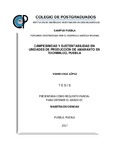Campesinidad y sustentabilidad en unidades de producción de amaranto en Tochimilco, Puebla.
Abstract
Para satisfacer sus necesidades el hombre se apropia de la naturaleza mediante un intercambio con su entorno natural. Los modos de apropiación dominantes son el campesino y el agroindustrial. El primero promueve agroecosistemas sustentables y el segundo eficiencia productiva, lo cual genera mayores impactos negativos a la naturaleza. El objetivo fue analizar las características que definen a las Unidades de Producción (UP) de amaranto como campesinas o agroindustriales y medir su grado de sustentabilidad. El estudio se realizó en las comunidades La Magdalena Yancuitlalpan y San Lucas Tulcingo, municipio de Tochimilco, Puebla. La información se obtuvo mediante la aplicación de 74 cuestionarios y una guía de observación. Se generó un Índice de Campesinidad (IC) y para conocer la sustentabilidad se utilizó el MESMIS. Los resultados muestran que ambas comunidades tienen un manejo campesino; sin embargo, existe diferencia estadística en el IC (t=-2.031; p=0.047) debido al mayor empleo de energía fósil en San Lucas Tulcingo (IC=0.327) y a la importancia de la mano de obra familiar en La Magdalena Yancuitlalpan (IC=0.298). Las dos localidades tienen un grado de sustentabilidad de medio a alto con 75.56% y 73.21%, respectivamente. Se concluye que en ambas comunidades el modo de apropiación es campesino con un nivel de sustentabilidad de medio a alto. _______________ PEASANTRY AND SUSTAINABILITY IN AMARANTO PRODUCTION UNITS IN TOCHIMILCO, PUEBLA. ABSTRACT: To satisfy his needs man realizes the appropriation of nature through an exchange with his natural environment. The dominant modes of appropriation are the peasant and the agroindustrial. The first promotes sustainable agroecosystems and the second mode a productive efficiency, which generates greater negative impacts. The objective was to analyze the characteristics that define the Units of Production (UP) of amaranth as peasants or agroindustrials and measure the degree of sustainability. The study was carried out in the communities La Magdalena Yancuitlalpan and San Lucas Tulcingo, municipality of Tochimilco, Puebla. The information was obtained through the application of 74 questionnaires and an observation guide. A Peasiness Index (IC) was generated and the MESMIS was used for sustainability. The results show that both communities have a peasant management, however, there is a statistical difference in the IC (t = -2.031; p = 0.047) due to the higher use of fossil energy in San Lucas Tulcingo (IC = 0.327) and the importance of family labor in La Magdalena Yancuitlalpan (IC = 0.298). Both localities have a degree of sustainability from medium to high with 75.56% and 73.21%, respectively. It is concluded that in both communities the mode of appropriation is peasant with a level of sustainability from medium to high.
Collections
- Tesis MC, MT, MP y DC [398]
The following license files are associated with this item:


